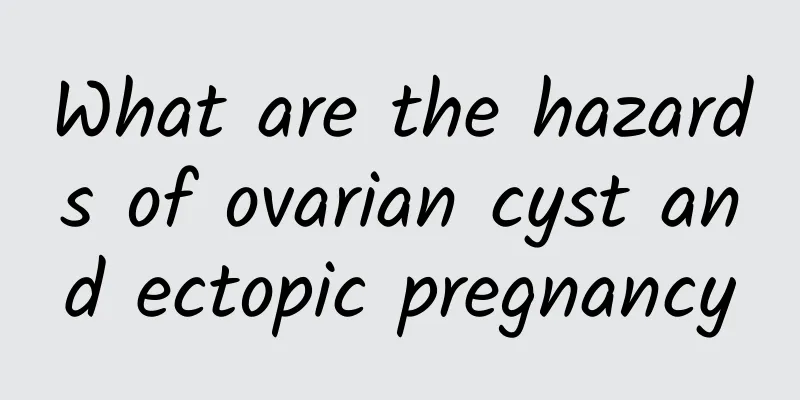What are the hazards of ovarian cyst and ectopic pregnancy

|
What are the dangers of ovarian cyst ectopic pregnancy? Ovarian cysts mainly occur in women after childbirth. They are a general term for true ovarian tumors and ovarian-like lesions. Gynecology points out that left tubal ampulla pregnancy is an ectopic pregnancy. Because the fallopian tube is not smooth, the fertilized egg cannot reach the uterus in time for implantation, and it has nothing to do with ovarian cysts. However, women with uterine fundus fibroids or ovarian cysts may also suffer from ectopic pregnancy due to the squeezing and traction of the tumor, the displacement of the uterus and fallopian tubes, and the change of the fallopian tube morphology, which hinders the normal implantation of the fertilized egg. The hazards of ovarian cysts are as follows: 1. Tumor pedicle torsion: When the tumor pedicle grows to the size of a fist or a fetal head, about 10% of ovarian tumors will torsion. Cystic teratomas, mucinous and serous cystadenomas are most likely to torsion. They may also rupture when turning over or intestinal peristalsis. 2. Ovarian cancer: Since the ovaries are located in the pelvic cavity, there are no symptoms in the early stage, and there is a lack of early diagnosis and identification methods. Once diagnosed as malignant, it is often an advanced cancer. Ovarian cysts can easily become enlarged, twisted, infected, bleeding or burst, posing a threat to the patient's life. The survival rate of ovarian cancer is the lowest. 3. Causes infertility: Ovarian cysts become larger or degenerate, causing sperm, eggs or fertilized eggs to not work normally, affecting fertility and leading to infertility. 4. Edema of the limbs: In addition to loss of appetite, weight loss, and abdominal distension, patients with ovarian cysts may also suffer from vomiting, fever, and abdominal pain; in the later stages, it may even lead to edema of the abdomen and limbs. 5. Rupture and rupture: The incidence of spontaneous cyst rupture is high. If the cyst ruptures or is squeezed, the viral fluid will flow into the patient's abdominal cavity, which can cause peritonitis, intestinal adhesions, and even intestinal obstruction, which is life-threatening. |
<<: What to do for Bartholinitis
>>: Causes of uterine fibroids
Recommend
Fruits and vegetables not only prevent colorectal cancer and improve cardiovascular health, but also have "these" unexpected benefits!
There are many health benefits to eating fruits a...
What are the treatments for primary dysmenorrhea?
Dysmenorrhea is a common disease among women. 75%...
TCM's understanding of the etiology of interictal bleeding in patients with functional uterine bleeding
TCM believes that the intermenstrual period is a ...
I was too passionate about killing monsters and I couldn't get rid of the fat bomb.
Are you a 3C geek who is troubled by obesity? Acc...
What are the specific causes of cervical erosion?
What are the specific causes of cervical erosion?...
What is the best medication for vulvar itching?
There are completely different reasons for vulvar...
How to care after uterine fibroid surgery?
Uterine fibroids are a common gynecological disea...
What are the dangers of ovarian cysts?
What are the dangers of ovarian cysts? 1. The cli...
What causes irregular menstruation in women? 4 causes of irregular menstruation in women
What is the reason for irregular menstruation in ...
Red marks on health checkup but no attention paid to abnormalities of three highs may indicate hidden dangers
Chronic diseases are also called "lifestyle ...
Lose weight easily at work! 7 to 9 am is the golden time for weight loss
According to the Department of Health's "...
【Video version】Lose weight following your menstrual cycle! Eat beef and kelp to get a lean body
A girl's menstrual cycle is divided into four...
What medicine should I take to treat uterine fibroids and blood heat? How to treat uterine fibroids and blood deficiency?
What medicine should I take to treat uterine fibr...
How much does it cost to treat cervical warts?
Cervical warts are a sexually transmitted disease...
Eat sweets to relieve stress? Beware of sugar addiction
Do you crave chocolate when you’re anxious? Do yo...









